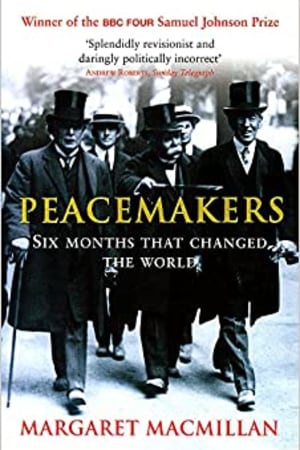Politics & Government
- Publisher : Hodder Hb; New Ed edition
- Published : 01 Jan 2003
- Pages : 592
- ISBN-10 : 0719562376
- ISBN-13 : 9780719562372
- Language : English
Peacemakers : The Paris Peace Conference of 1919 and Its Attempt to End War
Between January and July 1919, after the war to end all wars, men and women from all over the world converged on Paris for the Peace Conference. At its heart were the leaders of the three great powers - Woodrow Wilson, Lloyd George and Clemenceau. Kings, prime ministers and foreign ministers with their crowds of advisers rubbed shoulders with journalists and lobbyists for a hundred causes - from Armenian independence to women's rights. Everyone had business in Paris that year - T.E. Lawrence, Queen Marie of Romania, Maynard Keynes, Ho Chi Minh. There had never been anything like it before, and there never has been since. For six extraordinary months the city was effectively the centre of world government as the peacemakers wound up bankrupt empires and created new countries. They pushed Russia to the sidelines, alienated China and dismissed the Arabs, struggled with the problems of Kosovo, of the Kurds, and of a homeland for the Jews. The peacemakers, so it has been said, failed dismally; failed above all to prevent another war. Margaret MacMillan argues that they have unfairly been made scapegoats for the mistakes of those who came later. They tried to be evenhanded, but their goals - to make defeated countries pay without destroying them, to satisfy impossible nationalist dreams, to prevent the spread of Bolshevism and to establish a world order based on democracy and reason - could not be achieved by diplomacy. This book offers a prismatic view of the moment when much of the modern world was first sketched out.
Readers Top Reviews
SpirensisLes Fearnsw
"Peacemakers" by the Canadian historian Margaret MacMillan describes the six months of negotiations that took place in Paris. She does so mainly from the perspective of the main actors involved. The "Big Four" David Lloyd George (Britain), Vittorio Orlando (Italy), Georges Clemenceau (France), and last but not least Woodrow Wilson (United States) met informally 145 times and made all the major decisions, which in turn were ratified by the others. The book is based on thorough research and painstaking archival work, yet is lively and entertaining to read. As a great-granddaughter of Lloyd George, she tends to favour her famous ancestor to some degree but admits that his knowledge had great gaps (her geography is sometimes a bit fuzzy as well). However, I strongly oppose the validity of her conclusion that the conditions imposed on Germany in the Treaty of Versailles would not have prevented the rise of Adolf Hitler. It is true, in hindsight the terms of the 1919 Peace Treaty do not appear that harsh. But she completely ignores the psychological impact of (some of) these on public opinion in Germany. Especially, article 231, often known as the War Guilt Clause, became a major theme of Adolf Hitler's political career. His struggle against the "Shame of Versailles" and for the rebuilding of German military power, the recovery of the lost eastern provinces, and last but not least the restoration of German pride fostered his rise to power. The Congress of Vienna in 1815 ended the Napoleonic Wars in a way that was generally acceptable to all the major powers in Europe, even the defeated France. It established a general peace on the continent for some 50 or - if you will - some 100 years. In 1919 there were no negotiations with the defeated nations - they were only allowed to comment on the terms the victors had agreed on. After the Treaty of Versailles Marshal Ferdinand Foch said "This is not a peace. It is an armistice for twenty years". And so it came to pass: on September 1st, 1939 the world witnessed the beginnings of yet another World War that reached near apocalyptic levels.
piso mojadoVV
extraordinary book, a revelation in many ways, worth every bit of time and money
Paul Willis
A brilliant and entertaining account of the Peace Conference, the main actors, and the issues. Hard to put down. The companion book, the Road to War is just as good.
Piper
This was a fast transaction and the book was in great shape. I recommend this vender to shppers and would use again without reservation.


